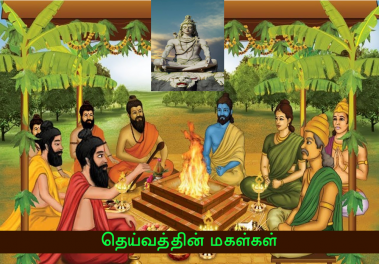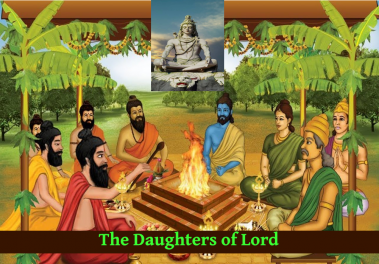Break All Obstacles
Conversation With Aiya (20)
We were sitting on the steps at the banks of river Bhagmati, right behind Shri Pashupatinath Temple at Kathmandu, Nepal. The evening had already started to draw the curtains on the sun light; the rows of oil-lit lamps along the temple-wall and on the banks of the river were like the flickers of golden paint thrown on the grey canvass of the sky. The ambience was sedative as the cool breeze caressing our faces carried the gentle rumbling of the river Bhagmati as a sweet lullaby into our ears.
Uma and I had been in Nepal for a week, touring with our daughter Keerti. We have been to Shri Pashupatinath Temple before; yet returning to the holy shrine again and again, and witnessing the mesmerising aarti to Bhagmati River need no rationale. However, on that evening I had another reason. Aiya who happened to be at Kathmandu in the midst of his Himalayan adventure was also at the river bank.
The crowd was slowly swelling with everyone finding a place to sit before the start of the aarti. We all sat next to the bridge, earnestly waiting for the event.
“Nepali people are very nice and kind”, said Uma, “but I am not at all comfortable with the ways in which they treat the temples or perform the prayer”.
“Why? What is wrong”, I asked.
“Don’t you see, they wear their shoes inside the temple. Everyone casually touches most of the deities. In the way they offer their prayers, it seems there is no reverence at all, as if the God is someone equal to them!”
“Well, it does not mean they disrespect God!”
“No, I am not saying that they are not devoted. Just that they don’t seem to know the bare essentials of worship. They seem to be confused as if they lacked proper guidance!”
Keerti said, “Mom, it is their tradition! In fact, there are so many traditions and cultures in Nepal that are all seen to have melted into a mushy-recipe”
“Exactly it is! That is why I say they are really confused.”
“Perhaps Uma”, I replied, “You see, this beautiful small country was, and is, a cradle of many different faiths and religions. Buddhism, Jainism, Hinduism and also various faculties of Hinduism, such as Shaktam etc. have all thrived here, all at the same time for many years. For this reason, the boundaries among these traditions had eroded; rituals and traditions were intermixed. You can see the evidence of this confusion in most of the temples, in their art forms, festivals etc.”
After a pause I quickly added, “But it is not a bad thing!”
Aiya smiled at Uma and asked.
“Do you see these Nepali people as a distressed or an anxious bunch?”
“No, not at all!” Uma hastily replied, “Nepali people, in fact, are seen to be quite contended. They seem to be happy in their own way”
“Exactly! If there is confusion, there would be anxiety and stress. They are not the confused-lot, perhaps some of us are! It is because we always appraise and employ discrimination; as we have firm terms of references to go by in our approach, we don’t tolerate ambiguity. Don’t get me wrong, that is also not a bad thing! But when such discriminative intellect is not supported by firm-conviction, there would also be confusion. For them, faith is the modus operandi. With sheer faith, they keep on doing what all have been traditionally handed over to them. So there is no confusion in them” said Aiya.
I added. “Well, I sort of agree. Yet, some sort of clarity and refinements to how they maintain temples and perform rituals must be done”.
Keerti interrupted. “One thing I can say definitely confusing is the Pillaiyar!”
“What!” I exclaimed at her interruption.
“Yes, I saw the sculpture of Lord Ganesh in the Buddha temples; I also saw in the Jain temples and in the Tibetan temples and in the Chinese temple too. Is it not confusion?”
“No, in fact, the concept of Lord Ganesh is adopted in all these faiths! This is so in even beyond the Asian religions. Mexico and in many of the South American and African countries also worship elephant-faced god to ward of obstacles. Perhaps the concept of Lord Ganesh is so appealing that all faiths have embellished the idol of Ganesh and the concept”
“What is the concept of Lord Ganesh”, asked Keerti.
“Well, Lord Ganesh is the remover of all obstacles and the protector from all fear. Freedom from “obstacles” and “fear” is a perpetual demand by everyone. So, a divine-manifestation that removes obstacles and offer protection is an adorable concept that could appeal to everyone”.
Saying thus, I looked at Aiya. Surely he would offer some greater insight, I thought.
“Elephant is the most powerful yet a gentle being, known to mankind on earth! They could live for 120 years, the same potential for human life-years. Like us, elephants also socialize in families and groups taking care of one another. Such aspects may be the reasons why an elephant-faced divine form is deemed as a perfect fit for the concept. Of course our Puranas offer many interesting legends describing the concept of Ganesh as the remover of obstacles and fear.”
“What obstacles? How does the Lord remove the obstacles that come in my way?” asked Keerti.
Aiya turned his position slightly towards Keerti. I have always found him intrigued when youngsters ask questions.
“Keerti, first of all, the very concept of having a divine-form especially to help us with the obstacles and fear is a quite-matured and valuable one. It is not about the Power that bestows the objects of our desires instead removes the obstacles and fear in all our endeavours. This very notion of God brings greater insights.”
Aiya continued.
“Normally when we pray we ask for objects or things from God, don’t we? Get me the job, grant me that wealth, help me to gain that property etc. Asking for things that we think should make us happy is one of the commonest prayers that we offer.”
“Yes”
“But attaining the object of desire is not good enough! If you are not able to enjoy the object of desire, then what is the point of attaining it?”
“You mean that I must have the capacity to enjoy!”
“Indeed! We need healthy body and mind to enjoy our life. So we also pray for the well-being of our instruments of enjoyment.”
“Correct Aiya, we need to attain the objects of desire and also our well-being to enjoy those objects.”
Aiya continued.
“Even if we get those two sorted, unless the environment or the field of experience is conducive, we cannot enjoy. What is the point of having lot of money but being stuck in the middle of a forest, for example! So the time, space and environment – in other words – the world around us should be good fit or our happiness. So we pray for healthy environment too. We often don’t think of that. Such prayers are not common unless we seek the well-beings of others.”
“Common sense Aiya”, Keerti said.
“If God grants us these three prayers then why at all we bother about endeavours and therefore any obstacle therein?”
“That is the very good question! The concept of Ganesh is supreme only for triggering such questions.”
Aiya continued.
“See, fear is the counter side to desire. Where there is desire, there is fear. In fact, all our prayers, ordinarily, are driven by our desires and fears. But we must not think that God is simply waiting to receive and process our prayers in some order! If everything can be gotten through prayer alone, why would anyone work?”
“Exactly”, said Keerti.
Uma intervened.
“Are we all not nurtured from young age to pray for anything and everything? Don’t the learned hail the prayer as the means to achieve anything!”
“Yes. Prayer when well understood is the most useful tool for us, initially to seek divine intervention and eventually to instil internal transformation. But be clear, God takes care of everyone and everything, whether He is being worshipped or not. Prayers do make a difference though, and that depends on who is praying and how the prayer is done.”
“Not clear Aiya.”
“Responsibility is what I am talking about”, said Aiya.
“As we grow, each one of us has assumed an identity for oneself and we nurture that identity into a personality. This sense of ‘I’ when becomes dominant, assumes a unique but a false identification of the Self. This is known as ‘abhiman’ or for the lack of better word in English, the ‘ego’. As abhiman gets stronger in us, we develop more and more discrimination; as a consequence, more and more desires – the likes and dislikes- and fear. Therefore know that the abhiman is the real differentiator!”
Aiya continued.
“See a child, as it has no abhiman, it is fearless. All that a child does is spontaneous without any desire or fear. Of course, as it grows, it gets conditioned by us to become one like us, an ego-driven personality.”
“Is that not a natural process? Why should we deem inferior?”
“Yes, of course it is a natural process. I am not saying having abhiman is somehow inferior. It is simply being ignorant. What I am driving is to recognize that as the process changes, the nature of relationship with God also changes.”
“How?”
“When there is no abhiman, then God is forever present to aid us in our endeavours and prayer is not a necessary means to gain His benevolence. Even if we do not pray, even if we do not seek His help – God is there to take care of everything for all those who have no burden of abhiman.”
“Then it is only for the children of certain age!”
“Well, for the children as well as for the Seers! In fact, anyone who performs righteous actions without any attachment to the outcome or the self-gratification is deemed as someone without abhiman. The needs of such people become the onus of God and so they see neither obstacles nor fear in their life.”
“Why such bias towards those with abhiman? Is it rational?”
“It is rational. To those with abhiman, God says this: since you have ego, you take responsibilities to earn and own your happiness and grief. I have created the universe and filled with all sorts of resources for you; so go and workout a path for you to enjoy. What I would do is to simply sit and watch you play your game! I will not ordinarily interfere, but I will promise you one thing! I will make sure that none of your actions go unnoticed. For every action that you have done, what is due to you as the result of the action, I will deliver it to you, fairly and timely. Saying thus, the God has taken the innermost place within each of us, so that He can have the best view of our play.”
“So He is watching by being inside me?” asked Keerti.
“Very much so, He is watching, He is enabling, and He is accounting for what you do. And He does in every one of us, at the same time and all the time!”
“Is it the same as Citra-Gupta the divine clerk of Lord of Death doing the accounting of our sins and virtues? We have legends in our Puranas. ” I asked.
“Sort of! Actually the term ‘Citra-Gupta’ in Sanskrit means ‘secret-picture’. By weaving interesting stories, the Puranas reveal that in the form of consciousness, there is an eternal witness to all our actions, within us.”
“How does the God duly provide for our efforts?”
“This He does without fail as He knows what is due to you, based on your actions and contributions. These are logged as your karma-phala and He is the Witness-eternal”
“But many a times I have worked diligently and prayed sincerely but the results were never materialized! So where is justice?”
“Well, this needs some understanding. God does two things in carrying out just distribution of benefits.”
We were intensely listening as Aiya continued.
“Firstly in your pursuit of goal, as soon as you have completed due tasks, God takes it over. He receives your efforts and then weighs them in terms of what sort of impact that those would cause to others and the world! This is mandated on Him as He is the custodian of all. As He has to sustain the order of the universe at His will, He may be required to alter the result of every action, taking into consideration simultaneously the actions of every one of us. Once He has decided the level of impact that you should get from your action, He then returns the result to you in as the outcome of your action.”
“Are you saying if I have not fully achieved my goal, it is God’s will?”, Keerti claimed.
“No, only when you have performed all due tasks that are to be performed correctly, then the result of your action is to be taken as influenced by the God, for His reason and role of ordaining dharma in the world. Again God does not do this arbitrarily; He takes your karma-phala or the accumulated papa and punya in offering His Grace.”
“What is the evidence of this?”
“Simply by looking at the directly inexplicable causes and the way obstacles come, diluting the efforts and the effects of our pursuits. You see, some obstacles are self-inflicted due to our ignorance, while some are imposed by others. There are other obstacles due to nature which are beyond our control. These affect our actions and the outcome.”
“Lord Ganesh can clear them all?”
“Yes!”
“How does He do, by miracle?”
Aiya laughed!
“My dear, miracle is in everything, you only have to see it! For a child everything around her is a miracle. Somehow as we grow older, we fail to appreciate the magic of nature. With strong abhiman and keen desire on material objects, we lose the ability to simply awe at nature. When did you last see the blossoming bud in a garden or the billion star-studded night sky and amazed? These days we search in Google to look for explaining the aspect of how and missing out on thinking the mystic aspect of why! Just observe, you are a miracle! How does your breathing occur? Who brings sleep to you at night and gently awakens in the morning? Magical, is it not! But when we chose to analyse, each miracle is also logical.”
After a pause, Aiya continued.
“Now to answer your question, yes, God does miracles to remove obstacles and fear, but only when you are able to see it earnestly. It can be only known within your own experience. Behold, His interventions could be also logical once you apply the discriminating intellect, coupled with the earnest commitment or the shradda.”
Raising both hands above his head, Aiya said.
“Who can define the ways of God? A bad dream that you have endured in a dream-state could be, due His benign grace, set in lieu of a severe accident to have encountered in the waken-state! Both are hard experiences to endure; by switching one for the other, God might have eased your problem and at the same time dispatched the dues of your Karma. Unless you have shradda you will miss to recognize such benevolence shown upon you. So develop shradda.”
“I have not recognized any miracles, but I have come to the conclusion that every object of happiness also brings the dose of grief” said Uma.
“Yes. This is the way Lord Ganesh steer us towards liberation, moving away from fear and despair. If we are able to accept life as it comes, then all obstacles lose their potency. Then ‘removing obstacles’ would simply become ‘removing the impact of obstacles’. That is the state of absolute strength or balance. That is only possible when we have transformation within ourselves. True knowledge is the only key for this.”
“What is that true knowledge?” I asked
“Within all forms of lives, there is the indwelling effulgence – the witness consciousness. You are That. That is the true knowledge by which the false notion of the Self, the abhiman is cut asunder. Lord Ganesh grants you the true knowledge. That is why He is the true destroyer of grief – shoka-vinasha-karanam.”
“Aiya, let the true knowledge dawn within us at the will of the God. But give us simple instruction to break all obstacles and free from fear”, I said earnestly in order to take baby-steps towards salvation.
“As God intervenes in all your efforts, deem the results of your actions as the gift of God. Therefore accept come what may! As the gift of God is always mysterious, drop all expectations. As we are no more the innocent children and not yet the evolved Seers, we must work to achieve our goals. So, upon the trust on the benign grace of Lord Ganesh, do what you need to do, diligently and perfectly”.
That was then the aarti bells began to sound. The priests on the other side of the river were starting the elaborate ritual, adoring Lord Pashupatinath and His consort as the river Bhagmati. A stone carved of image of Lord Ganesh was on the top of the wall, smiling away all the obstacles in front of the maha-aarti. With beaming hearts, the swollen crowd erupted with the divine call ‘Shambo! Jai Shambo!’.
Mee. Rajagopalan
13-September-2018



